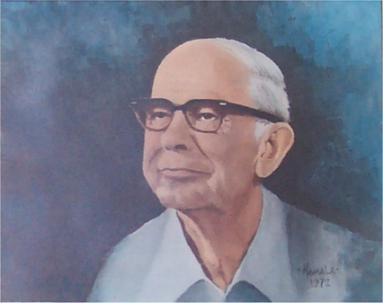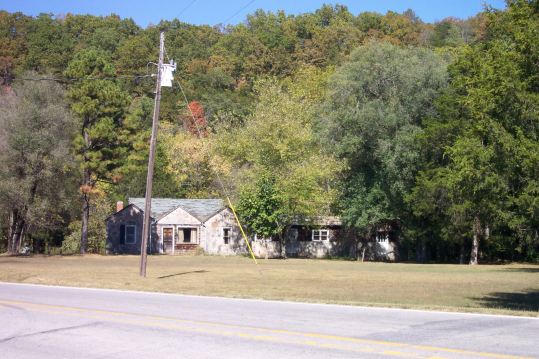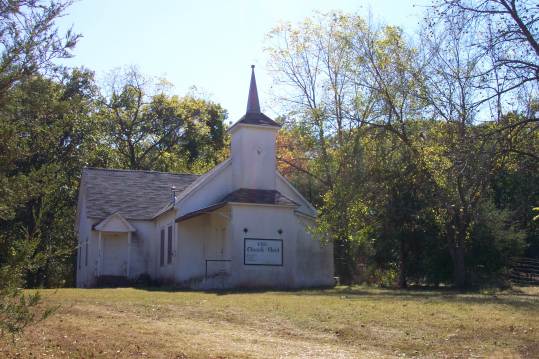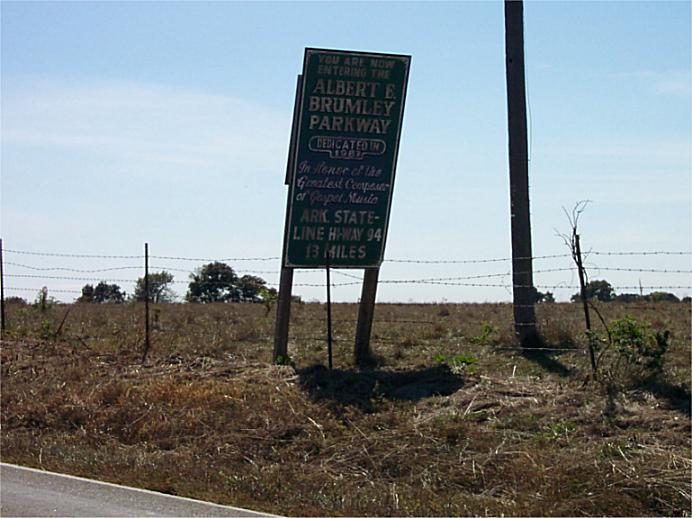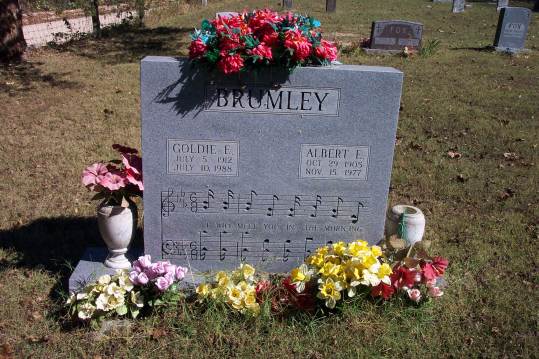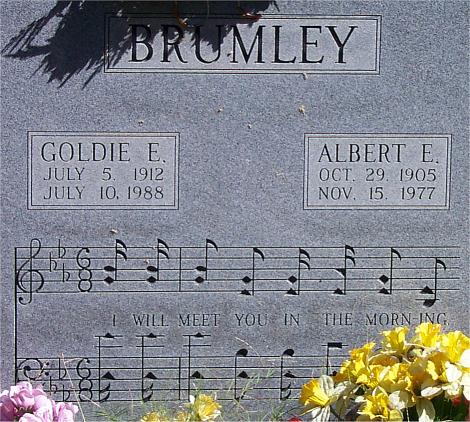|
Albert Edward
Brumley
Biographical Sketch On The Life Of Albert E. Brumley When Albert Brumley was born to hard working tenant farmers on October 29, 1905, no one guessed a great composer of gospel music had arrived. None could see from a dirt-poor cotton farm in Indian Territory to an honored place in the Gospel Music Hall of Fame in Nashville, Tennessee. Nevertheless, William Sherman and Sarah Isabelle (Williams) Brumley raised a great, prolific composer of gospel songs. If you had guessed Albert Brumley's future, you likely would have predicted he would become a sharecropper like his father. Even when he entered school the painfully shy "skinny kid" showed no sign of greatness. Albert had no idea what his destiny would be. Several years would pass before even a hint of what he was to become appeared. He was to live the humble life of a sharecropper before the world called him a great composer. Some viewed a sharecropper working cotton in eastern Oklahoma as being one short step above slavery. The Brumleys did not see it that way. William and Isabelle had strong religious beliefs. Hard work was considered honorable, even noble. Work-filled days were interlaced with pleasurable moments revolving around home, school, and church. Life was hard but not dull. William was a respectable fiddle player. Music was prevalent on the Brumley farm, especially after supper. Their fun largely revolved around socializing with friends and neighbors. As a young man, Albert worked hard and ate heartily as his mother's table. But he never "muscled up" like country boys often did. In spite of his appetite, he was always known as a "skinny kid." He was slim throughout his life. That boy whose size was sometimes the butt of jokes, became a big big man in the music scene around Spiro and Rock Island, Oklahoma. The first thing people noticed in Albert Brumley was his rich bass voice. Albert was a good cotton picker and enjoyed simple farm ways. He knew it took courage to farm and admired people who worked the land. During these years Albert absorbed the rich imagery of the land. It would serve him well throughout his long distinguished writing career. As a composer, he drew heavily on boyhood experiences. Albert attended public school in Rock Island, Oklahoma. He eventually completed the tenth grade. His style of dress made him stand out. He wore bib-overalls like the other boys, but he also wore a tie. This was highly unusual in a country school, but most amazing to his peers was how clean he always seemed to be. Albert participated in baseball, softball, and foot races. He played first base in overalls and a tie! At age sixteen Albert Brumley determined to write gospel music. That year he completed his first song, "I Can Hear Them Singing Over There." He would wait six years to see it published at age 22. He saw the song in print when it appeared in a 1927 convention book, "Gates of Glory." The lure of music had to be powerful to bring the shy young man out of Oklahoma. In 1926 Albert made a life-altering decision. He left the family farm and traveled east toward Hartford, Arkansas, searching for a "Good Samaritan." His name was Eugene Monroe Bartlett, owner of the Hartford Music Company and director of the Hartford Musical Institute. Albert thought of Mr. Bartlett as a Good Samaritan because he helped so many young people receive an education and get started in the music world. Now on a winter day in 1926 Albert E. Brumley came in search of the "Good Samaritan." For a young man raised in near poverty, formal musical training was almost an unthinkable luxury. But Albert was finally convinced to try. He left home wearing his only suit. After paying fifty-cents for the bus ride, he found himself in the small coal-mining town of Hartford, Arkansas with $2.50. Throwing back his frail shoulders, Albert found the Institute and soon located Mr. Bartlett in his office. He introduced himself and said, "Mr. Bartlett, I hear that you'll teach a fella how to sing and how to write music. I've come to learn and I understand I don't have to have any money." Mr. Bartlett asked Albert if he at least had money for tuition, which was five dollars. Albert answered, "No, sir." Bartlett then asked if he had any money for his room and board. Again the answer came, "No sir, Mr. Bartlett, I don't have any money period." Albert never forgot what happened next. The "Good Samaritan" looked the frail young man up and down and said, "Well, in that case you better go over to my house and board." The first meeting between Bartlett and Brumley proved to be a memorable one. Over the weeks and months the man and boy developed a loyal friendship that lasted until Mr. Bartlett died in 1941. With Albert's tuition fee, room, and board provided, he immediately enrolled in classes at the Hartford Musical Institute. His studies began in January 1926, and continued through the spring of 1927. He did not return to Hartford that fall. However, he made it back in 1928 and continued his studies through 1931. In 1926 he began teaching singing schools. Albert taught singing schools, normals, and appeared in many singing conventions in Arkansas, Oklahoma, and Missouri. At one of these schools in Powell, Missouri he met Goldie Schell. They married in 1931 and lived in Powell until Albert's death on November 15, 1977. Ms. Goldie was a constant source of encouragement. She proved the perfect wife for an immensely talented, creative, and slightly eccentric musical genius. To say Albert Brumley was unorganized is polite. His habit of working on multiple songs was a source of frustration for himself and everyone around him. He could never remember where he left the last song he was working on. He constantly wrote ideas and verses on scraps of paper, which occasionally ended up in the wastebasket and had to be retrieved. No amount of filing or office space could remedy the problem, so Goldie proved to be the "walking filing cabinet." The absent-minded composer could have solved the problem by setting up an office away from the family home. But Albert would have no part of that. He insisted on working at home, probably because he wanted to test new songs on Goldie. She too grew up in singing schools. Goldie understood gospel music almost as well as Albert. He valued her opinion about music and often hummed tunes to her for approval. However, she never supplied words for a song-composition was his exclusive domain. The only exception was his father-in-law, Joe Schell, who was a great student of the Scriptures. On occasion Albert would take a new song to Joe Schell and ask if the words were Biblically accurate. Albert said when he was writing "Salvation Has Been Brought Down," he read the words to his Father-in-law. Originally Albert wrote "Salvation Will Be Brought Down." Mr. Schell said, "Albert, salvation has already been brought down," so the song title was corrected and changed from "will be" to "has been." Albert knew the key to a successful song was the wedding of words to music, so he became a careful student of language. According to Goldie, "When Albert decided he wanted to be a songwriter, he started studying English ... on his own." He knew that to create phrases strong enough to convey a musical message, he needed a through knowledge of the English language. He recognized the value of good grammar. He also knew instinctively there were "right" words and "wrong" words for every situation. Albert understood how important it was to create linguistic "music" or rhythm when stringing words and phrases together. From the earliest days of his career until his death Albert had two books at his side. One was a rhyming dictionary and the other was Roget's Thesaurus. These were vital tools and were as much a part of writing as pencil and paper. Albert never failed to carry pencil and paper. Countless stories are told of him suddenly scratching away during Sunday worship, or while driving! It was his practice that anytime he had an idea, he wrote it down-no matter where he was. During Albert's year away from school he wrote that special song he called "a little ditty," entitled "I'll Fly Away." It became the song most associated with his long career. It is fitting that it was born while he was away from school living the simple life in the cotton fields of Oklahoma. Albert composed more than seven hundred songs including "I'll Fly Away," "I'll Meet You In The Morning," "Jesus, Hold My Hand," "The Blood That Stained The Old Rugged Cross," "Sometimes It's Hard To Understand," "Turn Your Radio On," and "If We Never Meet Again." He also wrote many sentimental songs like "Did You Ever Go Sailing?," "O Mother, Sweet Mother," and "Nobody Answered Me." Major recording companies recorded more than one hundred Brumley songs. Several have been translated into foreign languages. Albert is the only gospel song writer to have four exclusive albums of his songs recorded on major labels by well known recording artists, one each by The Chuck Wagon Gang, The Statesmen Quartet, The Smitty Gatlin Trio, and The Shelton Brothers Trio. Though his work was labeled "southern gospel," it was accepted and performed by all kinds of musicians. After the songs were written, pop, country, jazz, and even rock musicians performed them. Groups as varied as the Chuck Wagon Gang, the Boston Pops Orchestra, and Oak Ridge Boys performed Brumley music. Artists as diverse as Elvis Presley, Charley Pride, the Ray Charles Singers, and George Jones performed Brumley songs. -Lindell Mitchell, Fort Worth Lectures 2002, Hymns And Songs We Sing, Chapter - "The Blood That Stained The Old Rugged Cross" pgs. 257-263
Old Homeplace And Family Business Location
Albert E. Brumley And Sons
Directions To The Grave Of Albert & Goldie Brumley GPS Coordinates
Albert and Goldie Brumley are buried in the Fox Cemetery in Missouri's southwest corner, in the little township of Powell. In October, 2004, I visited with Don Deffenbaugh, preacher and writer of "Uncle Rue" A Biography Of Roland Rudolph Porter. Don most graciously took out time from his schedule, and took me out to visit the grave of Rue Porter. While at Porter's grave in Boulder City he suggested we go a few miles further to Powell to visit the grave of Albert Brumley. I was elated, to say the least, as it was unknown to me at the time that Brumley's home and publishing company were anywhere near. If you visit the Brumley home, you are not many miles from Rue Porter's grave. If coming from Neosho, Missouri you will go through Boulder City on Hwy D. Continue travel to Hwy E south. Hwy. 76 will join Hwy E for a while, then Hwy 76 will turn to the right. Stay on E, but know that you are now about 5 miles from the Brumley home and publishing company. As you come into Powell you will see the publishing company on the right. The day I was there, I went in and visited with Brumley's son, Bob, who runs the company. Across the street from the publishing company you will see the old homeplace of Albert and Goldie Brumley. Behind the house is Mike's Creek Rd. Take the gravel road 2.6 miles to Fox Cemetery. Just inside the gate you will easily see the Brumley monument. You will also pass the Fox Church of Christ (presently closed) where Brumley attended worship for many years and gained much inspiration for the many songs he wrote.
Nashville Songwriters Hall Of Fame More On Albert E. Brumley And Sons History Home History Index Page
|
